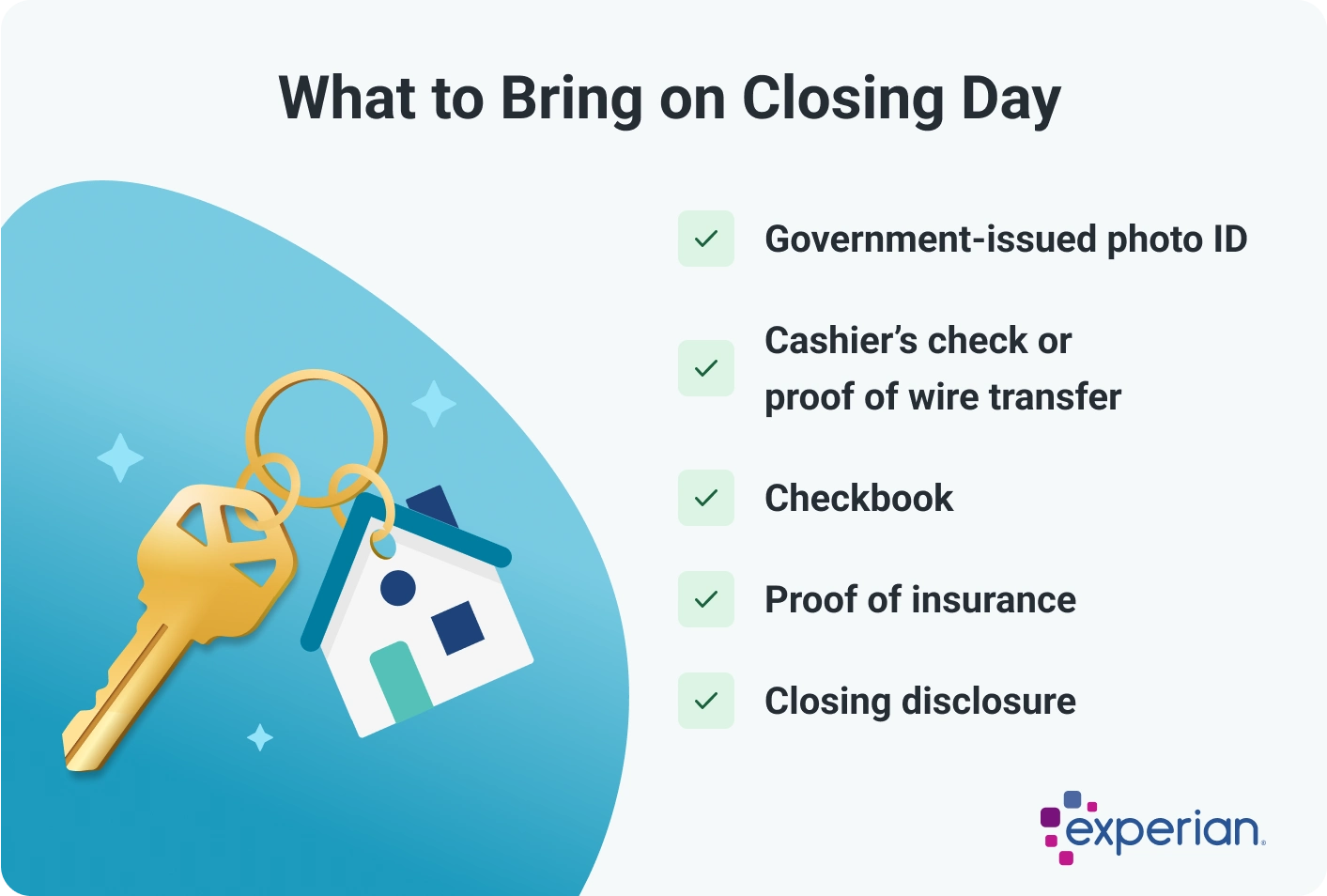The Complete Guide to Closing on a House
Quick Answer
Closing on a home is a multi-step process that involves gathering documents, reviewing your application, doing your due diligence, obtaining insurance coverage, preparing your finances, locking in your rate and attending the closing meeting.

Buying a home is a significant financial commitment for both you and the lender, so it's no surprise that closing on a loan involves a lot of work. There are several steps involved in closing on a house, and staying on top of your responsibilities is crucial for avoiding delays.
Whether you're getting ready to close on a home or you're planning to buy a home in the near future, here's what to know about the closing process.
What Is the Closing Process on a House?
Closing is the final step in the homebuying process. Also known as settlement, the closing process involves finalizing everything you need and signing the necessary documents to complete your purchase.
But while the closing meeting itself may take no more than one to two hours, preparing for that appointment requires a lot of work by multiple parties, including the buyer, the seller, real estate agents, title agents, your lender and, in some cases, real estate attorneys.
As such, it generally takes between 30 and 60 days after your offer is accepted to complete the transaction. Understanding the process can help you know what's going on every step of the way and minimize potential delays.
Learn more: Mistakes to Avoid When Closing on a Mortgage
How to Prepare to Close on a House
Closing on a house is a lengthy process, and with many moving parts, it's important to stay in communication with your real estate agent and lender—and follow up if necessary to keep things moving.
Here are the steps you'll take to ensure that you remain on schedule with your home purchase.
1. Review Your Documents
You'll receive many documents throughout the mortgage process, and it's important to review each one promptly to fully understand your loan's terms. Here's a quick summary of the documents you can expect:
- Loan estimate: The lender must send the loan estimate to you within three business days of receiving your application. It will provide you with an estimate of your interest rate, monthly payment and closing costs based on the initial review of your credit and financial situation.
- Closing disclosure: You'll receive this document at least three business days before your closing date. It includes the final details of your mortgage loan, which you can compare to the loan estimate.
- Promissory note: Signing this indicates your promise to repay the mortgage loan as agreed.
- Mortgage agreement: When you sign this document, you agree to use the home as collateral for your mortgage loan and that the lender can foreclose on the home in the event that you fail to repay the debt.
- Initial escrow statement: This document lists the estimated insurance premiums, property taxes and other charges the lender anticipates paying from your escrow account in the first year of the loan.
- Title documents: A title company will complete a title search to verify that the seller has the right to sell you the property, and the various title documents help ensure a smooth transfer of ownership.
- Seller's disclosure: The home seller must disclose potential problems that may impact the value of the home, as well as future expenses for you. State requirements may vary, but the disclosure will typically include details about past repairs, water damage, infestations, foundation problems, lead paint, system malfunctions and more.
Tip: If you're working with a real estate agent to help you buy your home, they can serve as a great resource when you're applying for a loan, entering escrow and closing. Consider reaching out to them for advice if you have questions you can't answer on your own.
Compare mortgage rates
Check today’s rates to find the best loan offers. Staying updated on current rates helps you secure a competitive mortgage and save more over time.
2. Review Your Loan Application
After making an offer on a home, it's a good idea to look over your loan application again to make sure the information you provided is accurate.
In some cases, it may be necessary to update your application with new details about a job or income change, additional debts or other important aspects that have changed.
3. Get a Home Inspection
Part of your due diligence when buying a home is to have the property inspected by an independent professional.
Home inspections can confirm issues detailed in the seller's disclosure and even uncover potential problems that aren't listed. It's crucial to order a home inspection as soon as you can because it can give you time to negotiate repairs or other concessions with the seller.
Learn more: How to Choose a Home Inspector
4. Choose a Homeowners Insurance Policy
Mortgage lenders typically require you to maintain homeowners insurance on the property you're planning to buy because it protects their investment. You'll need to provide proof of coverage before you can close on your loan.
The cost of home insurance can vary based on several factors, such as the home's condition and location, property features, your claims history, coverage limits, deductibles and more. Each insurance company has its own approach to determining rates, so it's a good idea to shop around and compare quotes from multiple insurers before you move forward.
It's also important to note that you can usually get a discount if you bundle your home and auto insurance.
5. Prepare Your Finances for Closing
There are several expenses you'll need to manage throughout the closing process, and it's important to make sure you have the funds available to cover them:
- Earnest money: Within a couple of days after your offer is accepted, you'll typically need to pay a deposit of 1% to 2% of the sales price. This is your earnest money, and it indicates that you're a serious buyer. The funds are held in an escrow account and can be used for closing costs or your down payment at closing��—though you may forfeit the money if you back out of the deal for a reason not approved in your purchase agreement.
- Down payment: Your down payment directly reduces your loan amount. While experts often recommend that you put down at least 20% of the purchase price, loan programs often require much less—and some government-backed loans don't require a down payment at all.
- Closing costs: Your closing costs will be detailed in your loan estimate and closing disclosure and are designed to cover the cost of originating the loan.
The title company should explain when and how to transfer the funds—also known as the cash to close—usually with a wire transfer or cashier's check.
Learn more: Can You Negotiate Closing Costs?
6. Lock In Your Mortgage and Interest Rate
Mortgage rates can fluctuate on a daily basis, so it's important to lock in a rate as quickly as possible to protect yourself from rate increases. You can typically lock a mortgage rate for 30 to 60 days, but longer locks are available in some cases.
During that time, your rate won't change, even if the market does—though there are exceptions if some of the details of your application change. However, some lenders may allow you to adjust your rate if market rates decrease before you close.
7. Schedule a Final Walk-Through
Shortly before your closing meeting, you'll want to do a final walk-through of the property to ensure that the home is in the condition you expect. During this time, you'll want to verify repairs you've requested from the seller and identify other issues, so you can handle them before completing the sale.
8. Bring the Necessary Documents to Closing
The title company will give you a list of documents you'll need to bring to your closing meeting, but you can generally expect to have the following when you show up:
- Government-issued photo ID
- Cashier's check for your cash to close or a confirmation of your wire transfer
- Checkbook (in case there are last-minute changes to your cash to close)
- Proof of insurance
- Closing disclosure

9. Sign the Closing Documents
The closing meeting is primarily about signing the various documents needed to finalize the loan and complete the sale. The title agent will walk you through the process, explaining each document to you before you sign.
As you go through the process, it's crucial that you compare the loan terms with the closing disclosure you received before your closing date.
What to Expect on Closing Day
Closing on your new home is an exciting time. Here's what you can expect to do when you show up to your meeting:
- Provide your documents. It's important to verify your identity and provide the other required documents to avoid delays.
- Pay closing costs. As previously mentioned, the title company will tell you how to pay your closing costs. If you did so with a wire transfer, bring the confirmation to your closing appointment. Otherwise, bring your cashier's check with the amount required to close.
- Review and sign documents. Don't be afraid to take your time to read through each document to make sure there aren't any surprises after you complete the process.
- Receive the keys. If the seller has already completed their closing, you may receive the keys to the home as soon as you complete your side of the process. However, you may not yet receive the keys if the seller's meeting is later or if you've agreed to a later possession date.
Frequently Asked Questions
Safeguard Your Credit Throughout the Closing Process
As you work diligently to close on time, it's critical that you avoid taking any steps that could negatively impact your credit score. A meaningful drop in your score can delay your closing or even result in a loan denial.
Throughout the mortgage process, it's important to regularly monitor your credit reports and FICO® ScoreΘ. You can check your Experian credit report for free and get free weekly reports from other credit bureaus through AnnualCreditReport.com.
If you notice any developments that could impact your mortgage approval, work to address them immediately. Also, stay in contact with your lender and notify them of potential financial problems, so you can avoid a last-minute delay or denial.
Curious about your mortgage options?
Explore personalized solutions from multiple lenders and make informed decisions about your home financing. Leverage expert advice to see if you can save thousands of dollars.
Learn moreAbout the author
Ben Luthi has worked in financial planning, banking and auto finance, and writes about all aspects of money. His work has appeared in Time, Success, USA Today, Credit Karma, NerdWallet, Wirecutter and more.
Read more from Ben